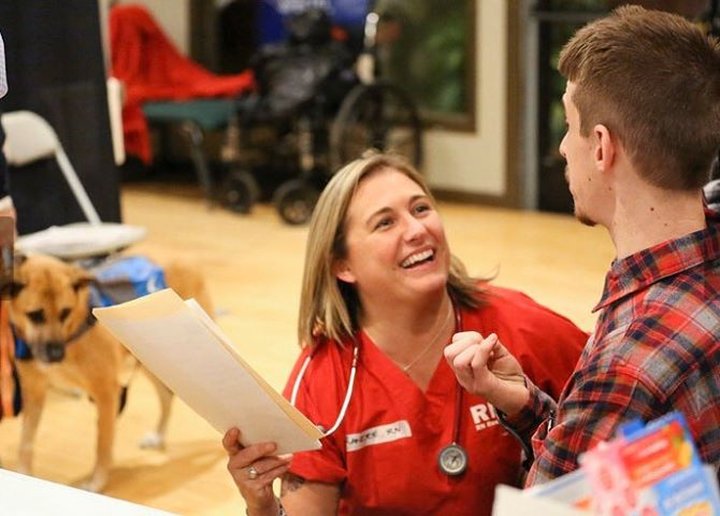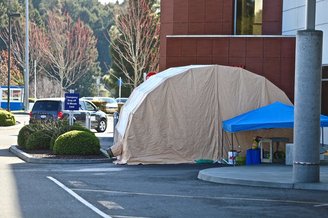
Nurse Randee Litten. Photo courtesy her.
Randee Litten, a nurse who works at St. Joseph Hospital, is assigned to the emergency room, and as such she’s been in the trenches of the first wave of the county’s response to the COVID-19 epidemic.
Earlier this afternoon, Litten was kind enough to give part of her day off to the Outpost for a quick conversation about what life’s like for health care professionals in these stressful times, whether her experience working as a nurse in disaster zones overseas has helped her through this current crisis, and much more.
Litten is a member of the California Nurses Association, and spoke to us on behalf of that organization and its members. The conversation below has been lightly edited for grammar and clarity on both sides.
###
So how is everybody doing up there? How are all the nurses and doctors doing?
It’s mixed emotions, really. You know, for the frontline staff, the emergency department, I can tell you that there is a level of calm that’s happening right now amongst the staff members. We’re realizing that there’s a lot of people in this community that are really freaked out, and there’s a lot of misinformation out there, too. There are a lot of people who are panicking and so we’re kind of trying to be the center of calm for our community at this time.
That’s excellent. What kind of misinformation are you seeing that’s most damaging, or most conspicuous?
I think the hardest part for people right now is that they’re being told by whoever — I think the President of the United States even said, “If you want to test you’re going to get one.”
Well, it’s not that simple. For one, there’s a lack of testing. We only have a limited amount right now, so we’re following strict CDC guidelines for who actually gets tested. So a lot of people are showing up to the emergency department or they’re calling us and they’re demanding that they be tested, but if they don’t meet the specific criteria the chances are you’re not going to get a test right now. We’re just encouraging people to go home, manage their symptoms at home. If you have a sore throat, mild fevers, those are things that you can take care of at home.
We are not turning anybody away by any means if they need medical attention — that is what we’re there for — but we are finding that a lot of people, as soon as they develop symptoms they want to test, and it’s just unfortunately not that simple right now until more tests are allocated.
I think that the local Public Health department has been pretty good. I think they’ve been trying to get the word out there: Here’s the numbers to call if if you think you have symptoms, you call this number to get medical advice…
I’m really proud of our community right now. I feel that Public Health has really showed up. You know, we set up a COVID-19 tent — it’s kind of an external waiting room for potential COVID patients — outside our emergency department so that we’re not exposing potential COVID patients to the general public. We’re keeping them isolated.
I feel like for a community who’s never gone through something like this before we’re being asked to step it up really fast, and I mean, I’m finding that, you know, nurses are coming in on their days off to help run this tent, and we’re doing everything that we possibly can and trying to stay calm in the presence of all this chaos right now.

COVID tent at St. Joseph Hospital. Photo: Andrew Goff.
What is the tent for? Should people drive up and go into the tent if they think they have symptoms?
There’s a lot of these drive-up tents that people are seeing in other states, and that’s not what this is. This is not a drive-up tent. There is talk that they’ll be trying to open annexes around the community for testing. I’m not sure what those are going to look like, but right now we’re using this as an external waiting room for potential COVID-19 patients.
So people who have traveled outside of the country, or who have been around people who have traveled to these countries, they’re calling ahead and they’re saying “I have these symptoms,” and if they do qualify for the testing we’re meeting them at the front door and we’re putting full PPE precautions and taking them into the external tent, so that they don’t have to come into the emergency department and possibly infect others.
So is the recommendation that everybody call ahead?
Absolutely. I mean, the recommendation is to call your primary care provider or Public Health, but we are manning the front of the emergency department right now with two nurses who are fielding phone calls. We’re getting hundreds of phone calls a day.
And absolutely, that’s what we’re there for. We’re there to answer your questions. If you do call the hospital, extension 2414 will get you straight to somebody who can determine whether or not you meet the appropriate testing [requirements]. So we’re doing everything we can to help the community right now with the limited resources that we have.
I guess the steps that you’d like to see is first everyone take a sort of self-assessment — I know that St. Joe’s and Mad River have these online — to then talk to their primary care physician if they have one, or Public Health…
Yeah, people have to remember that we’re still running an emergency department. Even though there’s a viral pandemic happening right now, we’re still taking care of 110 patients a day in the emergency department. So adding all of this chaos on top of running an emergency department is very unsafe. If they can manage their symptoms at home and they can go through a primary care doctor, that is the best way to handle this at this time — until more testing sites open up around the community.
And is it your understanding that there will be more test kits coming soon?
I hope so. That’s definitely my hope. I think as time goes on, we’re gonna get into a more steady flow of how to handle all of this, but at this time we do have limited testing.
So, Randee, you’ve gone to disaster situations all around the world before. We’ve run some of the stories about you going overseas to help in times of crisis. Does this remind you of that? Are there similarities?
I think that’s why I’m so calm during all of this.
I feel like it’s really easy for people to lose sight of … of kindness, even in moments like this. You know, I just went to the grocery store myself yesterday because I was legitimately out of a toilet paper. It took me four grocery stores before I could finally get toilet paper!
So I think there is a level of fear and a level of panic that’s happening right now, and so any of us in the frontline health care field who can be the calm in the storm? That’s our role. That’s what we’re here to do.
I mean, I love this community. This is my home. And I’ve even said it, you know, in the past, when I was traveling to other countries for disasters, it was only matter of time before something hit our own community. And so it’s nice to be able to help and be calm during this crisis, and offer my expertise in nursing.
I think the big message that we should be getting across is that people need to try and stay calm, because there really are a lot of unknowns right now. And take advice from the medical professionals who are saying stay home. That’s really important. Self-isolation is really the key to flattening this curve right now.
CLICK TO MANAGE